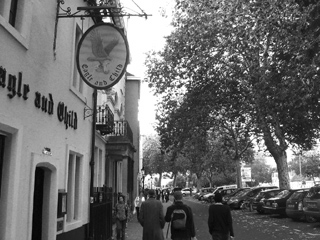
After four successive weeks of high table dinners in Wadham College, I have become attuned to their patterns. Those who arrive early or have guests tend to congregate in the Senior Common Room (SCR), just below the MCR, in the main quad. From there, they head over to the hall, to meet those who proceeded there directly.
Dinner itself is bread, an appetizer (usually soup), a main, and dessert. Wine is served to accompany. Unlike the Red Room in New College, where there is Sherry beforehand and both a white and a red wine with dinner, at Wadham it is simply two glasses of the same sort of wine. In both cases, I generally find myself to be the only vegetarian at the table. For the past couple of weeks, I have been even more unusual, insofar as I have been declining the wine, in hopes of speeding my recuperation from this tenacious illness.
After dinner, if there is a senior member of the college who takes it upon themselves to organize it, people retire to either the Old Library – if there are many people coming along – or the Old Senior Common Room, if there are fewer. Tonight, five of us went to the latter, marking the first time I had even been inside. The reasonably small, green-paneled and candle-lit room definitely feels more intimate than the Old Library, which is probably half as large as the dining hall. I should like to return their once the cold has set in a bit further, and the fire is going. In either place, people converse and eat fruit and chocolates, while drinking sweet after-dinner drinks, like port and claret.
After that, people often head to the SCR for coffee from the famously expensive espresso machine. The conversation is usually about people’s areas of research, with interested individuals trying to learn more about fields in which they are non-expert. One of the fellows today actually worked as part of the team at NASA that operates the Hubble Space Telescope. When talk of research areas fail, people discuss the peculiarities of Oxford.
In attendance are usually between three and five graduates: either those being brought as guests by their college advisers or those who have privileges attached to offices or scholarships. In my case, the dinners are part of my Senior Scholarship. In addition to the graduates, there are usually about a dozen fellows of the college and their guests. Since there are usually three rotations of who you are sitting beside and across from, you actually get to meet a good number of people. This is reinforced through seeing some every couple of weeks.
The New College dinners – which I attend as a member of the Strategic Studies Group executive – tend to be more lavish, but the Wadham ones definitely feel more exclusive. This is particularly the case when people retire for port and fruit in one of the old rooms afterwards. Aside from a greater diversity of people present, the whole arrangement is probably not enormously different from when Christopher Wren and Isaac Newton apparently ate, drank, and conversed in these same places.
PS. I realize the photo is garbage, but the light was bad, I had nothing to brace against, and I was pressed for time. I will try for a better one next time.




